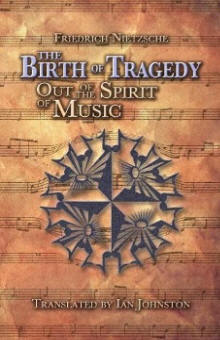Questions? Call us
toll free:
1-800-856-3060
Birth of Tragedy by Friedrich Nietzsche
Translated by Ian Johnston
Friedrich Nietzsche’s The Birth of Tragedy Out of
the Spirit of Music, published in 1872, is not only the first major work
of the most provocative voice in modern philosophy but also the most
important study of Greek tragedy since Aristotle’s Poetics. In this
remarkable essay Nietzsche announces his aggressive challenge to many of
the most cherished philosophical assumptions of his own time,
re-evaluates the development of classical Greek culture, and establishes
aesthetic concepts which have had a decisive influence on modern
discussions of art.
The Greeks, Nietzsche argues, were in the period of their greatest
achievements thoroughly pessimistic but found in artistic creativity the
only possible justification for existence. As a result of this
development they produced Greek tragedy, the noblest affirmation of
human life. The later development of Greek culture, particularly the
influence of Socrates and Euripides, was not, as so many modern
classicists have maintained, the high point of Greek achievement, but a
significant decline, the onset of a sickness from which the world is
still suffering (a significant symptom of which is our preoccupation
with morality, especially Christian morality and our faith in scientific
scholarship).
Central to Nietzsche’s discussion is his analysis of the
development of Greek tragedy as the result of the inherent tension
between and ultimate reconciliation of two conflicting artistic
impulses, the Apollonian and the Dionysian (corresponding to the two
sources of artistic inspiration, dreams and intoxication, the former
giving rise to the plastic arts and the latter to ecstatic visions and
music). Only with the appropriate synthesis of these two drives could
the highest form of life be attained.
The Birth of Tragedy received a cool reception in Nietzsche’s
day, especially from the academic community, but it has since become a
central document in modern aesthetics and has led to a significant
reappraisal of the nature of Classical Greek culture. The book also
serves as an eloquent introduction to the disturbing challenges
Nietzsche issued to modern thinking.
Ian Johnston’s new translation captures the energy, eloquence, and power
of Nietzsche’s unique philosophical style in this extraordinary and
influential work.
Classics/ Philosophy ISBN: 978-1-935238-90-4 USD $13.95
At Richer Resources, we are dedicated to the creation of high quality books, art and other media intended to enrich the lives of individuals of all ages.
As an independent publisher, we are bound by a sense of integrity and quality to produce products which enhance the lives and vision of individuals everywhere.
Sign up to receive notice of free eBooks, new releases and special subscriber-only offers.
(You can unsubscribe at any time)
